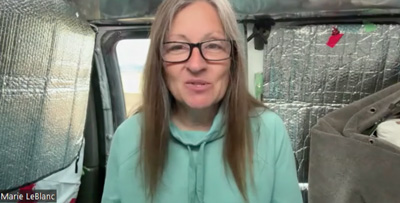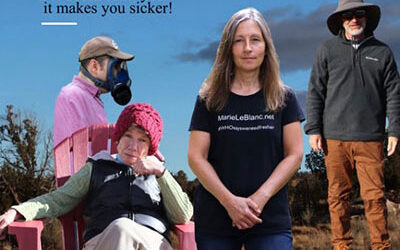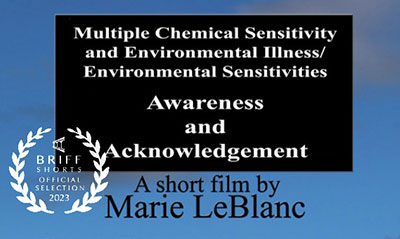by Mary Swander
Reprinted from Out of This World: A Journey of Healing, with the permission of the University of Iowa Press.
The spring I was thirty-three, I paid Johnny the neighbor a quarter for every frog he could catch. The amphibians arrived on my porch in coffee cans, Kermits squiggling, croaking and hopping against the round metal sides. Inside my house, quickly and as painlessly as I knew how, I smashed the frog’s head with a hammer, cut off its legs and broiled them for dinner. Johnny laughed when I wrapped my hand around the frog’s neck and readied it for execution.
“Ooh, look at its eyes bug out!”
I trembled and gripped the hammer hard. Johnny thought this all great fun and more profitable than a paper route. I found it repulsive but cheaper than spending twelve dollars every week on the delicacy.
Why so much trouble for frog legs? I desperately needed them not for gourmet pleasure but for survival as they were some of the only “safe foods” I could tolerate in the early days of my, what then was called “Environmental Illness.” Now this illness is better known as Multiple Chemical Sensitivity or Chronic Fatigue Syndrome. I’d become hyper-sensitive to chemicals in 1983 after I had been given an overdose of vaccine. Most of my first year of recovery was spent in my house isolated from people with their cigars and cigarettes, their scented, formaldehyde-based lotions, hair sprays and colognes that gave me raging headaches and crippling doube-over stomach pains. I avoided going anywhere where I might come into contact with moldy basements, new carpet and its glue fumes, fresh varnish or paint, fresh tar, gasoline or diesel exhaust, insect or yard sprays with their 2-4D, office machines with their inks and alcohols.
After a long confining winter, a spring frog gig became one of my first ventures into the outside world. Before I struck my deal with Johnny, I tried to catch them myself.
“No big deal,” a fisherman had told me. “You just dangle a little piece of red cloth over their heads on the end of a pole. They jump for it and you’ve got ‘em.”
Seemed easy enough, so one cool, wet evening, pole and flashlight in my backseat, I ventured out of my room and drove to my friend Peggy’s farm. We waded toward the squishy edge of her pond, pushing away the shoulder-high weeds, our sneakers, covered with stick-tights, sinking into the mud. Frogs sang and jumped through the reeds. Slowly, deliberately, crawling on my belly, I inched toward them with my pole, a tiny piece of a bandanna stuck to the fishhook. But just when I got in position, the crunch of a bur oak sapling gave me away, and the frogs fell mute, diving down into the depths of the algae-filmed water, fanning out for safer ground.
“Hey, they’re over here now.” Peggy waved on the other side of the pond. I trudged in her direction, the sun fading, the mosquitoes buzzing and bombing my ears. I tried again, crouching in the weeds, my pole shooting out over the bank. Peggy stood ready with the flashlight in hopes of stunning the frogs into submission with its glow. But the creatures only fell silent and eluded us. I moved again and again, until the darkness engulfed us and my line became bound up, tangled in a willow branch, and we finally had to cut off the hook to free it from the leaves. At last, we groped our way back to Peggy’s farmhouse, laughing and croaking our own frog imitations.
“Rivet, rivet,” we called, giggling at our failure, joking and telling fish stories until I found my way to my car.
“Well, no frogs for you tonight. You’ll just have to eat lobster,” Peggy cracked.
I pulled out of the lane and headed home, leaving Peggy on her front porch still with tears in her eyes from the fun, then nosed through the dark night, tears streaming down my face in frustration and rage. Suddenly, nothing was funny.
Emotionally that spring, I became both predator and prey. While “on the hunt”, I felt like one of those frogs, operating at some base level, completely on instinct, displaying raw, gut reactions. If something poked me one place, my whole being retracted, drew in. If something poked me another place, I’d gather up all my strength and leap away. My days were spent hopping from one task to another, searching out, preserving, and cooking my organic foods, fighting my insurance company, trying to keep my therapeutic massage practice going to make enough money to pay for air, water, and furnace filters, drops, drugs, and vitamins, special clothes, bedding and soaps. Inching toward me, I felt the constant presence of the human who might lift me out of the pond and gobble me up. I stroked through the water, trying to keep just a few inches ahead of my decent into the great beyond.
I plunged through the stages of grief, swimming from one to another in a matter of weeks. At first, I was stunned by what had happened to me and couldn’t visualize my future life without Christmas dinner, or ever again tasting a single bite of bread. I raged against smokers who kept almost every public building, site, or private home inaccessible to me. I sank into despair when I opened my closet door and realized I’d have to give away most of my clothes and rid my house of any synthetics. I made a bargain with God to keep me alive long enough to complete my new book of poems. I was ashamed my affliction was so big and such an inconvenience to others.
“I’m sorry to have to ask,” I said. “but when you come to my house, could you not wear perfume?”
I was ashamed my affliction was so small. How could I complain when I still had a roof over my head and could get up and down the stairs alone? Finally, I accepted my problem and buckled down to gig frogs. What I never did was deny my illness nor its seriousness. I didn’t have to. Everyone else did that for me.
Most disabled fight to let the able-bodied world know that they are not their disability, that they are capable of normal activities and functioning. I wanted the able-bodied to grasp that I was different, very different, and couldn’t “function normally,” couldn’t eat, sleep, dress, work or socialize the same way they did. I tried to get my point across, but couldn’t. Even most traditional M.D.’s deny Environmental Illness exists, and explain it away as “depression.” So, how was the lay person going to understand? I was locked inside myself, and grew to resent even the majority, the supportive people who tried to understand.
When my hands became crippled and I had to close my therapeutic massage business, friends and even other disabled urged me to go underground with my condition. “Don’t tell them you’re ill,” they said as I set off for job interviews. “Just sign the contract.” The advise, as wise as it may have been at the time, made me crazy. Even if I had wanted to “pass” as able-bodied, I couldn’t. I couldn’t work in an air-tight building. I couldn’t attend smoke-filled meetings seated next to perfumed colleagues. I couldn’t travel to conferences. I couldn’t “do lunch.”
I couldn’t get anybody to get it. I applied for disability compensation and was turned down because they didn’t have a code number for Environmental Illness in their books. I went to Social Services for help to pay for my prescription drugs and was advised to immigrate to a country with socialized medicine. I joined support groups, but no one had ever heard of a situation like mine. I read through women’s health literature, and even in books like Our Bodies, Ourselves, couldn’t find one line on E.I.—an illness whose population is 90% female. I subscribed to magazines for the disabled, but never even saw a single article addressing auto-immune diseases. I took my accessibility problem to my city’s Disability Rights Commission and was waved away with a laugh and shrug.
I went on TV to fight my insurance company to pay my hospital bill. I sued the doctor who had given me the vaccine overdose, and couldn’t get my own lawyer to understand I couldn’t fly a thousand miles on a smoky plane to a highly polluted city for a deposition. I contacted my San Francisco specialist, the same man who had analyzed the contents of my vaccine and told me I was lucky to be alive, but couldn’t get him to testify on my behalf. Then, a month before my trial, I couldn’t go on any longer.
I cried for two weeks. Every day, I worked and functioned for three to four hours at a time, then put my head down on my desk and wept. I dug organic carrots out of my garden, washed and juiced them, then ranted at anyone, anything around—the plumber, the dog, the petunia planter—collapsing into bed in a heap. Night after night, I dreamed of chocolate cake, a luscious piece of dessert, deep, rich and swirled with frosting, on the end of a fork, just about to glide onto my tongue. My watering mouth hung open, the cake approaching ever so closely. I wanted to eat it, how I wanted to jump at the bait, take just one bite of that cake, but I knew I didn’t dare close my lips around it. I woke wild and weepy. Psychically, I was leveled, back on Peggy’s bank on my hands and knees, hunting for sustenance, my fishing line hopelessly wound up in the willow tree. Something had to change. I needed to set myself free from the tangle.
One night, cake poised in front of my face, I said to myself, “This is only a dream. You can forget the frog legs for now and go ahead and eat the dessert.” The fork rose to my lips. I hesitated, staring at the chocolate. “That’s right, go ahead. This is only a dream. You have permission.” My teeth parted. “You’ll be all right, really.” My mouth closed, encircling the tines. Oh, the sponginess, the delicate texture, sweet taste of the cake against my tongue! I savored the first bite, then taking my time and enormous pleasure in the sight and smell of the dessert, the way it was arranged on its china plate, the gleam of light bouncing off the silver fork drifting down into the frosting, I ate the entire slice.
I woke up smiling, understanding that my life was reality—not a dream—and even if others denied it, I could find a way to live with its consequences more peacefully. After that, in my night time fantasies, I gobbled up elegant entrees at the best French restaurants, toured the globe to sample full course Indian, Bulgarian and Moroccan dinners with wine, candle light, linen tablecloths, with violinists serenading, cadres of dancers swirling and twirling past in long flowing back dresses, clicking castanets. In the morning, my cravings were satisfied, my stomach full.
Then I discovered ways to find satisfaction in my waking state. Within my isolation, I found I had the time and space to read hundreds of books—poetry books, novels, travelogues, natural history narratives about deserts and wetlands, yucca and frogs. I wrote three more books of my own and learned to build glass-enclosed cases to shelve them away from dust. Within the confines of my diet, I’ve developed extensive gardening skills, not only branching out into heirloom varieties but experimenting with designs, shapes and configurations. Adding fruit trees, prairie grasses and flowers to my yard. I’ve learned to distinguish between a black samson and a prairie coneflower, between a pipevine and an eastern tiger swallowtail butterfly, delighting in the insects’ paths as they glided and dipped over the wild cherry tree. My world was small but well-explored.
And the exploration turned inward.
“What can we list as losses?” my lawyer had asked me before we filed the suit. “You didn’t have much income to begin with. You had no spouse, so we can’t sue for loss of affection. See, if you could no longer have relations with your husband, we could get money out of that for him. ”
Once again, I tried to explain to him my circumstances.
“You’re condemned to a life of loneliness,” he said at last.
“Yes.”
“Going to be hard to pitch. You don’t have any burn marks, or a missing leg. That’s what a jury wants to see. There’s where you get the big awards.”
The big awards, or rewards, I finally discovered were going to come from turning my life sentence around into a life passion. The Bird Man from Alcatraz. The Frog Woman from Iowa. Why not? Loneliness became solitude with time to sort through and access the chain of events that had led me to the Fairview School. Solitude gave me time away from the noise of the world, the constant croaking of other people’s needs and desires, to mourn my losses—even though I had no missing limbs. Then, as if I’d spread myself in a dissecting tray in a high school biology class, I probed and poked at my soul to try to better understand the strengths and weaknesses of my character, the intricacies of my relationships to others, and my connection with my spirituality.
The country roads became my nerve fibers, and up and down the hills, over the gravel, through the old railroad beds, I bicycled, building up my strength, observing the exotic environs of my own neighborhood. I raced Amish buggies and whizzed by farmsteads with rag dolls, white and faceless, pinned to the clothesline, tumbling and turning in the wind. Their small owners, barefoot and aproned, tumbled their own turns on the trampoline in their yard, flipping over in somersaults in mid-air. While my friends showed me slides of their latest trip to Tahiti, their grass hotel hut crammed full of tropical fruit, I showed them slides of Esther Chupp’s root cellar, her 50 canning jar of peaches lining the far wall.
When things weren’t peachy keen, I learned to confront the gigglers, the eyebrow raisers. “You’ve never heard of Environmental Illness?” I asked. Little by little, I became a more assertive, more political animal, recognizing the ripples that emanate from the plop of my illness in the pond. I had a problem that was part of a much bigger pattern of disregard for our environment, for the invisibly disabled, for women. I began to write letters, editorials, become involved in environmental causes larger than myself.
Within my circle, my individual case became educational. I’ve read that frogs are very sensitive to polluted water, and will die from chemical contaminants long before fish in the same pond. Dozens of people have told me that they would never have give a thought to problems like pesticides in the food chain nor indoor air pollution if they hadn’t known me. Sure, they understood things on an abstract level, and although they still weren’t real certain about the validity of my illness, they began to entertain the thought that there might, just might, be a link between their sudden headaches and their new carpet glue fumes.
Daily, my health is improving, the environmental and disability rights movements gaining momentum. Women’s physical problems are at least beginning to be discussed. But losing my health has made me question not only the goodness of doctors, but every principle, every custom and mode of behavior I once took for granted. It has made me critical of the whole American way of life, and thrown me back to a more primitive existence. I have enough foods in my diet now that I don’t have to eat frog legs, but it would be nice to go down to the local cafe once in a while for pancakes, sausage and a cup of coffee.
Instead, every spring when the leaves unfurl with their sudden burst of energy, transforming themselves from tadpoles to full-grown adults in just a few short days, I take my breakfast to the pond and eat on the picnic table. Chewing slowly, I remember the anniversary of my illness, thankful I’ve seen another year. Above me, the sun shines down, beginning to warm the surfaces of things—my skin, the ground, the ripples in the pond. Next to me, the frogs burrow out of the deep mud where they’ve hibernated for the winter, hop from log to lily pod, singing out over the water one of their first tunes of the season.
Mary Swander is the author of several highly acclaimed books of poetry (Driving the Body Back) and memoirs (Out of This World and The Desert Pilgrim). She is a commentator on Iowa Public Radio and a Distinguished Professor at Iowa State University. Read more about her and her work at www.maryswander.com.










0 Comments